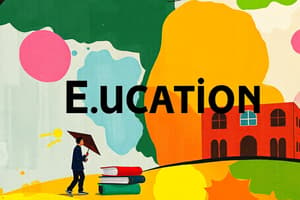Podcast
Questions and Answers
What defines formal education?
What defines formal education?
- It occurs spontaneously in daily life.
- It is flexible and adaptable to individual needs.
- It occurs outside of any organized structure.
- It follows a prescribed curriculum and is delivered by trained teachers. (correct)
Which term refers to the methods and practice of teaching?
Which term refers to the methods and practice of teaching?
- Andragogy
- Curriculum
- Pedagogy (correct)
- Assessment
What is the main focus of secondary education?
What is the main focus of secondary education?
- Providing adult education outside formal institutions.
- Preparing students for higher education. (correct)
- Preparing individuals for entry into the workforce.
- Teaching foundational skills to young children.
Which educational theory emphasizes personal growth and self-actualization?
Which educational theory emphasizes personal growth and self-actualization?
What is a key concept related to evaluating student learning?
What is a key concept related to evaluating student learning?
What trend in education focuses on the use of technology in classrooms?
What trend in education focuses on the use of technology in classrooms?
How does education contribute to social mobility?
How does education contribute to social mobility?
What characterizes non-formal education?
What characterizes non-formal education?
Flashcards are hidden until you start studying
Study Notes
Overview of Education
- Definition: Education is the process of acquiring knowledge, skills, values, and attitudes through various means such as teaching, training, or research.
Types of Education
-
Formal Education
- Structured and systematic.
- Delivered by trained teachers in institutions (schools, colleges, universities).
- Follows a prescribed curriculum.
-
Informal Education
- Unstructured and spontaneous.
- Occurs in daily life through experiences, family interactions, and social environments.
-
Non-formal Education
- Flexible and adaptable.
- Organized educational activities outside formal institutions (community education, adult education).
Educational Systems
- Primary Education: Basic education focusing on foundational skills (reading, writing, mathematics).
- Secondary Education: Follows primary education; usually includes middle and high school, often focused on preparing for higher education.
- Tertiary Education: Higher education including colleges and universities, leading to degrees and advanced studies.
Key Concepts
- Curriculum: The subjects and content taught in educational institutions.
- Pedagogy: The methods and practice of teaching.
- Assessment: Evaluation of student learning through tests, exams, and other forms of measurement.
Educational Theories
- Behaviorism: Learning as a response to external stimuli, emphasizing reinforcement and punishment.
- Constructivism: Knowledge is constructed through interactions and experiences; emphasizes active learning.
- Humanism: Focus on personal growth and self-actualization, nurturing emotional and social development.
Importance of Education
- Personal Development: Encourages critical thinking, problem-solving, and creativity.
- Social Mobility: Provides opportunities for economic advancement and improved quality of life.
- Civic Engagement: Fosters informed citizenship and participation in democratic processes.
Current Trends
- Tech Integration: Use of technology (online classes, educational apps) in traditional learning environments.
- Lifelong Learning: The concept of ongoing education throughout a person’s life, adapting to changing job markets and personal interests.
- Inclusive Education: Ensures access to education for all individuals, including those with disabilities and marginalized groups.
Challenges
- Access and Equity: Disparities in educational opportunities based on socioeconomic status, geography, and ethnicity.
- Quality of Education: Variability in educational standards and resources between regions and schools.
- Adaptation to Change: Need for education systems to evolve in response to technological advancements and societal changes.
Definition
- Education is a continuous process of gaining knowledge, skills, values, and attitudes.
Types
- Formal Education: Structured, delivered by trained teachers in institutions, follows a predefined curriculum.
- Informal Education: Unstructured, learned through life experiences, family, and social interactions.
- Non-formal Education: Flexible, organized activities outside traditional institutions like community or adult education programs.
Educational Systems
- Primary Education: Focuses on basic foundational skills, including reading, writing, and math.
- Secondary Education: Builds on primary education, typically encompassing middle and high school, often preparing students for higher education.
- Tertiary Education: Encompasses colleges and universities, leading to degrees and advanced studies.
Key Concepts
- Curriculum: The subjects and content taught in educational institutions.
- Pedagogy: The methods and practices used in teaching.
- Assessment: Evaluating student learning through tests, exams, and other measures.
Educational Theories
- Behaviorism: Learning as a response to external stimuli, emphasizing reinforcement and punishment.
- Constructivism: Knowledge is built through interactions and experiences, emphasizing active learning.
- Humanism: Focuses on personal growth and self-actualization, nurturing emotional and social development.
Importance of Education
- Personal Development: Encourages critical thinking, problem-solving, and creativity.
- Social Mobility: Creates opportunities for economic advancement and improved quality of life.
- Civic Engagement: Fosters informed citizenship and participation in democratic processes.
Current Trends
- Tech Integration: Integrating technology in learning environments, including online classes and educational apps.
- Lifelong Learning: The concept of ongoing education for adapting to changing job markets and personal interests.
- Inclusive Education: Ensuring access to education for all, including individuals with disabilities and marginalized groups.
Challenges
- Access and Equity: Disparities in educational opportunities based on socioeconomic status, geography, and ethnicity.
- Quality of Education: Variability in educational standards and resources between regions and schools.
- Adaptation to Change: The need for education systems to evolve in response to technological advancements and societal changes.
Studying That Suits You
Use AI to generate personalized quizzes and flashcards to suit your learning preferences.




